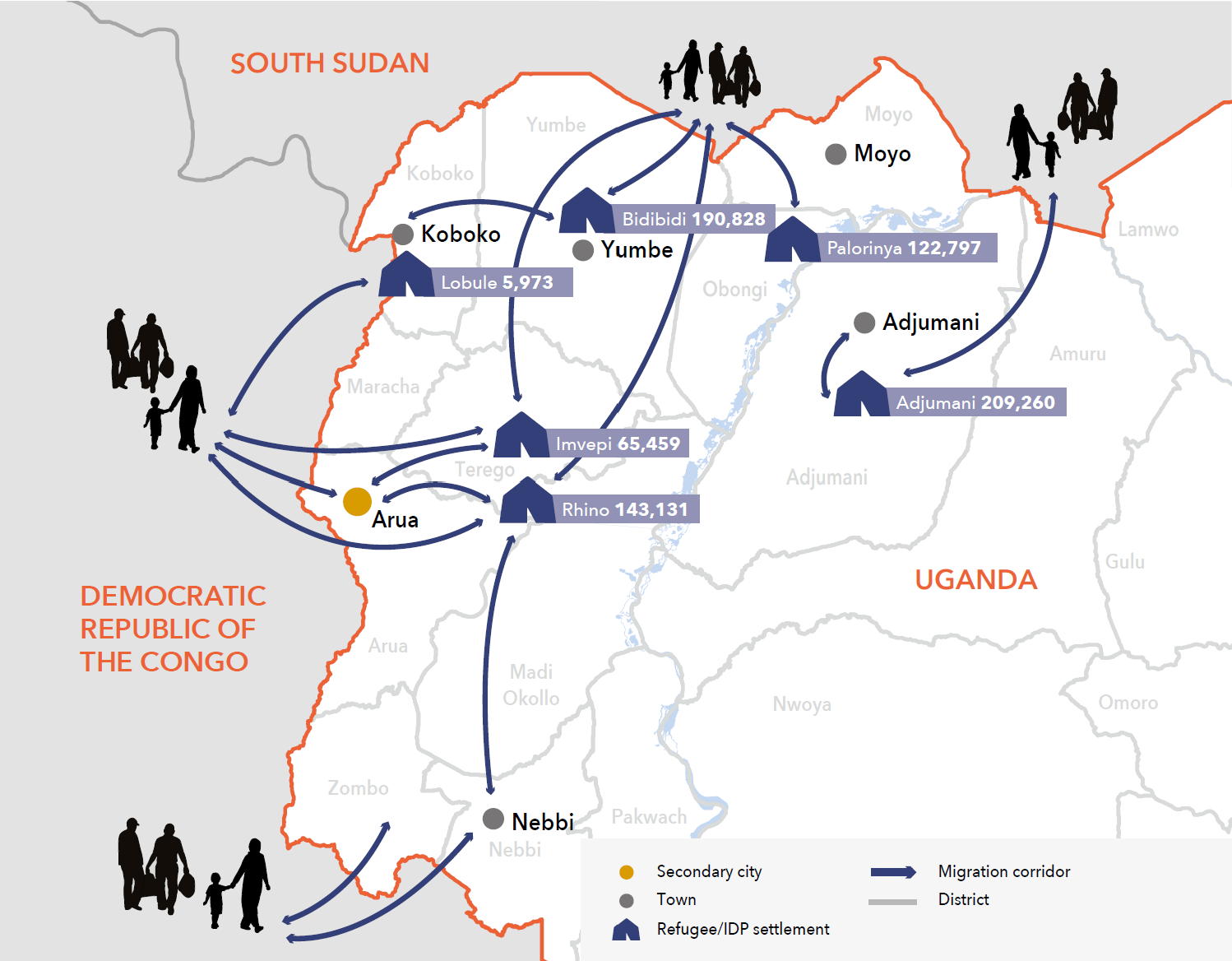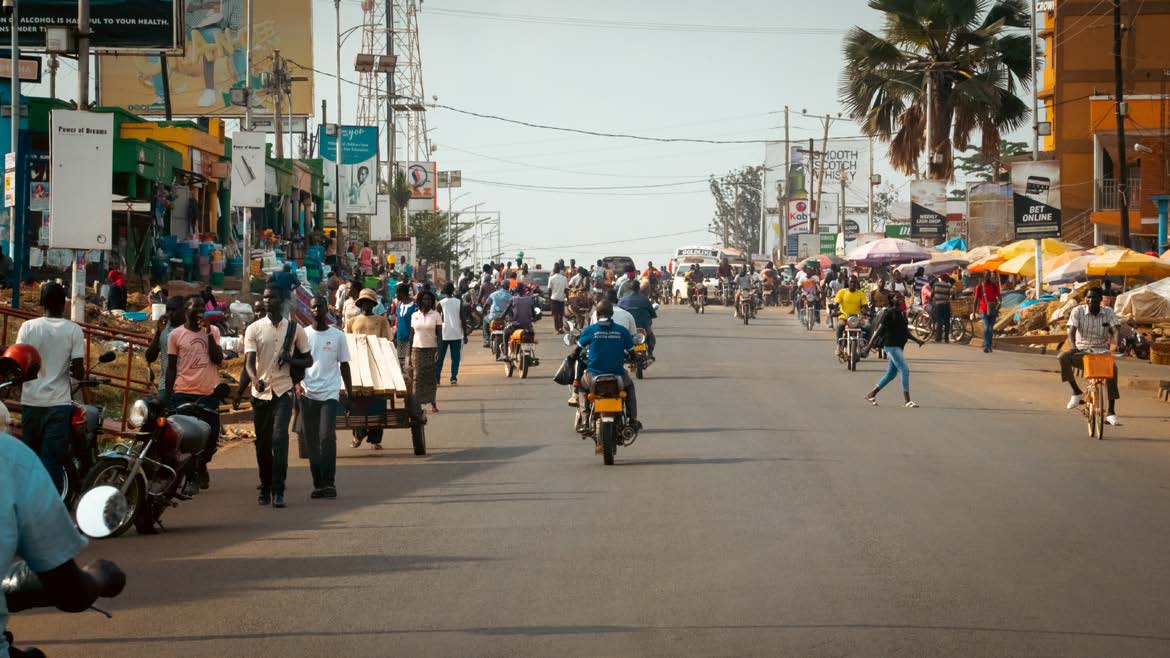The West Nile region is a major refugee-hosting area in Uganda that borders the Democratic Republic of the Congo (DRC) and South Sudan. The people of the region share many similarities in language, culture, and history with their neighbours in these two countries – critical factors explaining the refugee influx.
A general decline in financing for refugee operations in West Nile has also driven migrants and refugees to relocate from settlements to the surrounding urban areas, and they are often unregistered and undocumented. This means migrants and refugees are not included in the national census or factored into the different local government planning and budget processes.
As a result, West Nile cities face severe pressure on key public services and infrastructures such as schools, hospitals, water, and sanitation. Without clear financing and planning modalities, local authorities are unable to meet the service needs of both refugees and host communities.
A more organised approach to managing refugees will help alleviate concerns about poverty, access to basic services, environmental damage, and mental health.
This project will provide access to financial services to refugees, IDPs, and vulnerable host communities residing in cities in the West Nile region, with the goal of integrating them into the labour market and improving the provision of basic services.
It also aims to empower local and refugee-led organisations and foster dialogue among local authorities, the private sector, and civil society on key issues for greater social cohesion.
“Urbanisation is real, and migration is real. People flock from villages to towns, people will come intentionally and unintentionally. But governments know little about how many people are coming. The issue of data is very key in planning for these people.”
– Ms. Sarah Nandudu, National Coordinator, Slum Dwellers Federation of Uganda
The West Nile Region:
Has a population of 3.8 million (UBOS 2020 census)
Hosts 59% of the refugees and asylum seekers in Uganda, with most coming from the DRC and South Sudan
Has a poverty level of 34.9%, the second highest in Uganda
Comprises 11 districts, 15 local governments, and 116 lower local governments

Activities
- Providing access to financial services to refugees, IDPs, and vulnerable host communities residing in West Nile cities.
- Refurbishing and equipping maternal and mental health centres in the Oli Subdivision of Arua
- Training for health professionals, community workers, and schoolteachers so they can act as a first point of contact for both host communities and refugees.
- Training key experts and integrating them within existing infrastructures, including health centres and schools, to respond to the needs and demands of counselling for refugees and host communities.
- Organising at least six dialogues to advance the role of secondary cities in managing migration and refugee situations.
Scaling Up Phase I
This project builds on an earlier phase of activities supported by SDC from 2018–2022 and the first-ever enumeration of urban refugees by the Uganda National Bureau of Statistics (UBOS) in a secondary city (Arua).
It steps up the approach from Arua to the West Nile region, collecting data on refugees that will inform policy, planning, and resource allocation on the reception, management, and integration of refugees in urban areas.
The information will allow national authorities to gradually accommodate the needs of refugees residing in urban areas and recognise them across Uganda.
Partners
South Sudanese Refugees Association (SSURA), Arua City Council, Oli Health Centre, West Nile Development Agency (WENDA), Office of the Prime Minister (OPM) Department of Refugee Management, Equity Bank Uganda Limited, and Youth Initiative for Protection.
Each organisation fulfils a specific role:
- SSURA leads the partnership for this project. As a refugee-led organisation, it provides necessary perspective on the needs and capacities of refugees to foster greater inclusion and social cohesion.
- The Arua City Council will partner in the refurbishment of health facilities, training, and convening dialogues.
- As an association of West Nile local governments, WENDA will ensure a coordination of effort and transfer of knowledge and best practices within the 11 West Nile districts. WENDA will champion the dialogues with the objective of influencing policy change.
- The OPM will work with the Arua City Council and WENDA to organise the dialogues and provide the national government perspective.
- Equity Bank ensures that refugees and host communities have access to formal financial services, which remain available to them after the project ends.
- YIPE will raise awareness and foster dialogue among youth on gender, gender-based violence, reproductive health, and environmental management.
Anticipated Results
- At least 14,000 migrants, forcibly displaced, and vulnerable host community persons benefit from services that enable them to access new or better work opportunities in the West Nile region.
- Equity Bank will work with SSURA to provide financial services to vulnerable host communities, migrants, refugees, and displaced persons. These include training in financial literacy and business development, as well as providing loans to women and youth groups and training for new agents. All beneficiaries will be enrolled in the bank’s digital platforms to access better financial services.
- Up to 3,000 beneficiaries will experience new or better work opportunities as a result of the project.
- Two local multi-stakeholder initiatives and dialogues will be held. Koboko will host the first dialogue on remittances and engaging diasporas, and Arua will host the second on impact investment.
- At least 15,000 migrants, forcibly displaced, and vulnerable host communities will access basic municipal services due to local initiatives in Arua City and Koboko Municipality.
- The project will refurbish and enhance medical equipment at the Oli Health Centre IV in Arua, with a focus on maternal health services and medical staff dormitories.
- Up to 9,600 women per year will benefit from a renovated and equipped Oli Health Centre IV for maternal health services.
- A new trauma/counselling centre will be established at the Oli Health Centre, enhancing access to mental health services in Arua and Koboko.
- 130 professionals will be trained in trauma counselling, with some based at a new health centre in Koboko.
- Champion and dialogue clubs, with 204 members in four groups, will be established on gender and climate resilience to foster inclusion and social cohesion.
- Four national multi-stakeholder initiatives and dialogues will be convened to advance the recognition of urban refugees in secondary cities in the West Nile region and beyond and to foster the mandate and financial capacity of local authorities for greater inclusion and social cohesion at the local level.
Migration and forced displacement are highly engendered phenomena, and gender analyses and theories of change will inform locally appropriate gender-transformative action in urban contexts. The youth organisation YIPE will raise awareness and foster dialogue on gender, gender-based violence, reproductive health, and environmental management through its youth clubs.



